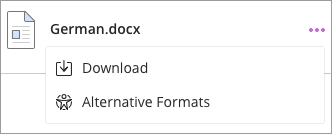Accessibility matters
We’re committed to fostering an inclusive educational environment for students with disabilities. Discover how we work to address disability-related challenges and empower every learner.
Accessibility matters
We’re committed to fostering an inclusive educational environment for students with disabilities. Discover how we work to address disability-related challenges and empower every learner.
Our accessibility policy
The University will develop, procure, maintain and use information and communication technology that ensure people with disabilities have comparable access to them.
All new or modified online content and functionality, including the education platform features, will be accessible to people with disabilities as measured by conformance to the benchmark standards set forth below, except where doing so would impose a fundamental alteration or undue burden.
In the event of a fundamental alteration or undue burden, the University will nevertheless provide equally effective alternate access. Alternate access will ensure, to the maximum extent possible, that persons with disabilities are afforded an equal opportunity to obtain the same result, to gain the same benefit, or to reach the same level of achievement, in the most integrated setting appropriate to the person’s needs. The University is committed to provide information where you can perceive, operate and understand.
University of Phoenix adheres to these universally accepted benchmark standards established by the World Wide Web Consortium (W3C) in meeting accessibility commitments.
- W3C’s Web Content Accessibility Guidelines (WCAG) 2.0 Level AA
- W3C’s Authoring Tool Accessibility Guidelines (ATAG) 2.0 for software used to create web content; Level AA
- W3C’s User Agent Accessibility Guidelines (UAAG) 1.0 for user agents supplied by the University, including media players
To achieve compliance with these standards, the University will use the following specifications and best practices (among others):
- Web Accessibility Initiative Accessible Rich Internet Applications Suite (WAI-ARIA) 1.0
- W3C’s MathML 3.0 specification for digital mathematical and scientific notation
- The DAISY Consortium’s Digital Accessible Information System (DAISY) Standard or the International Digital Publishing Forum’s (IDPF) EPUB 3 specification for digital publications and documents
- W3C’s Guidance on Applying WCAG 2.0 to Non-Web Information and Communications Technologies (WCAG2ICT) for non-web software and content
The guidelines, put forth by W3C, are organized around the following four principles of accessibility, which lay the foundation necessary for anyone to access and use web content. Anyone who wants to use the web must have content that is:
- Perceivable: Information and user interface components must be presentable to users in ways they can perceive that isn't invisible to all of their senses.
- Operable: User interface components and navigation must be operable.
- Understandable: Information and the operation of user interface must be understandable.
- Robust: Content must be robust enough that it can be interpreted reliably by a wide variety of user agents, including assistive technologies, and remain accessible as technologies and user agents evolve.
Resolution agreement
Regarding assistive technology
University of Phoenix and the U.S. Department of Education’s Office for Civil Rights (OCR) entered into a Resolution Agreement under which the University reaffirms its commitment to ensure independent and equal access to its programs, benefits and services for all students.
A link to the Resolution Agreement (PDF 310KB) is provided.
Accessiblity tools
University of Phoenix offers Blackboard Ally (YouTube) in the classroom. Ally is an accessibility tool that allows faculty to evaluate the accessibility of documents shared in the classroom and provides alternative formats of those documents for students.
Ally can check several file types, including:
- PDF files
- Microsoft® Word files
- Microsoft® PowerPoint® files
- OpenOffice/LibreOffice files
- Uploaded HTML files
- Image files (JPG, JPEG, GIF, PNG, BPM, TIFF)
- YouTubeTM Videos
Ally automatically creates alternative formats of documents shared in the classroom. The following formats are available for students:
- Tagged PDF (structured PDF for improved use with assistive technology)
- HTML (for viewing in browser or on mobile devices)
- ePub (for reading as an e-book on a tablet or other e-book reader)
- Electronic braille (BRF version for consumption on electronic braille displays)
- Audio (MP3 version for listening)
These are available by selecting the alternative formats option, selecting the ellipsis next to the document’s name and selecting the alternative formats menu option. No special request is needed.

For more information about the alternative formats available to students, please review the alternative formats overview available on the Blackboard help site.
Contact us
We’re here to support you and help you achieve your educational goals. If you’d like to learn more about what we do or talk about managing your disability and potential accommodations, please reach out to a member of our team.


For help troubleshooting accessibility issues, call the University's Assistive-Technology Technical Assistive Center (TAC) at (866) 842-5222. Assistance is available 5am-1am every day. You may also reach out to the Student Accommodations Office via phone or email using the contact buttons above.